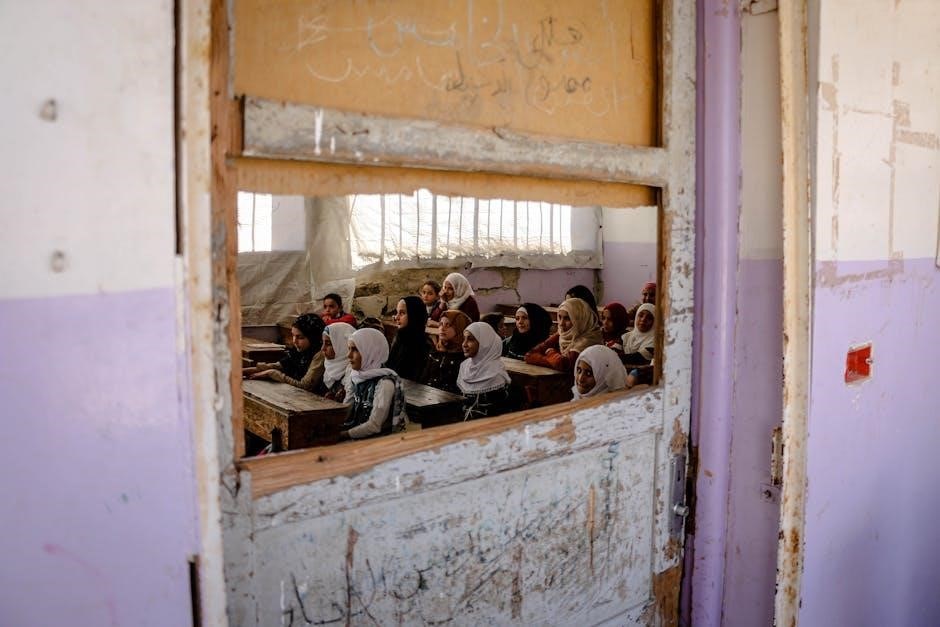An argumentative essay is a structured writing piece where students present a clear claim and support it with evidence. It helps middle schoolers develop critical thinking‚ research‚ and communication skills by exploring various topics like school policies‚ social issues‚ and technology. Through this format‚ students learn to articulate their opinions logically and address counterarguments effectively.
1.1 What is an Argumentative Essay?
An argumentative essay is a structured writing piece where a clear claim is made and supported with evidence. It typically includes an introduction‚ body‚ and conclusion. The writer must anticipate counterarguments and address them to strengthen their position. This format helps middle school students explore topics like school policies‚ social issues‚ or technology‚ fostering critical thinking and effective communication skills. The goal is to persuade the audience with logical reasoning and credible evidence‚ such as statistics or expert opinions.
1.2 Importance of Argumentative Writing for Middle Schoolers
Argumentative writing is crucial for middle schoolers as it enhances critical thinking and communication skills. It teaches them to research‚ organize ideas‚ and present logical arguments. This prepares them for high school and real-life discussions. By addressing counterarguments and using evidence‚ students develop a deeper understanding of various perspectives. Mastering this skill fosters confident‚ articulate individuals capable of engaging in meaningful debates and decision-making processes throughout their lives.
Popular Argumentative Essay Topics for Middle School
- Should schools enforce uniform policies?
- Is homework beneficial for student learning?
- Should cell phones be allowed in classrooms?
- Is bullying a serious issue in schools?
- Should junk food be banned in cafeterias?
2.1 School-Related Topics (e.g.‚ Homework‚ Uniforms‚ Cell Phone Policies)
School-related topics are ideal for middle school argumentative essays‚ as they resonate with students’ daily experiences. Debating issues like homework effectiveness‚ uniform policies‚ and cell phone usage encourages critical thinking. Students can argue whether homework improves academic performance or if uniforms promote equality. They might also discuss the benefits and distractions of cell phones in class. These topics are relatable‚ sparking engaging discussions and helping students develop persuasive writing skills. They also allow for personal opinions and real-world applications.
2.2 Social Issues (e.g.‚ Bullying‚ Social Media‚ Family Roles)
Social issues provide rich material for argumentative essays‚ allowing students to explore real-world problems. Topics like bullying‚ social media’s impact‚ and family roles encourage students to think deeply about societal challenges. For example‚ they might argue whether schools should implement stricter anti-bullying policies or if social media positively influences self-esteem. These topics are relevant and meaningful‚ helping students develop empathy and persuasive skills while addressing issues that affect their peers and communities directly.
2.3 Technology and Its Impact (e.g.‚ Screen Time‚ Video Games‚ Internet Access)
Technology-related topics engage students in discussions about modern life. Issues like screen time limits‚ the effects of video games‚ and internet accessibility spark debates. For instance‚ students can argue whether video games improve problem-solving skills or lead to aggression. These topics encourage critical thinking about how technology influences daily life and society‚ fostering informed opinions and well-supported arguments among middle school students.

Moral and Ethical Dilemmas
Moral and ethical dilemmas challenge students to explore complex issues‚ fostering empathy and critical thinking. Topics like drug testing‚ exclusion‚ and courage vs. thrill-seeking encourage nuanced discussions.
3.1 Should Middle School Students Be Drug Tested?
Drug testing in middle schools sparks debate about privacy‚ safety‚ and effectiveness. Proponents argue it deters substance abuse and creates a safer environment. Critics highlight concerns about students’ rights and the potential for mistrust between students and administrators. Evidence shows mixed results on its impact‚ making it a complex issue for discussion. This topic encourages students to weigh individual freedoms against societal responsibilities‚ fostering critical thinking and ethical reasoning skills.

3.2 Is It Ever Fair to Exclude Someone from a Group?
Excluding someone from a group raises questions about fairness‚ social dynamics‚ and emotional impact. While inclusion promotes diversity and empathy‚ exclusion can sometimes protect group harmony or safety. Middle schoolers often face peer pressure and social conflicts‚ making this issue highly relatable. Students can explore scenarios where exclusion might be justified‚ such as harmful behavior‚ versus instances where it fosters inequality. This topic helps develop understanding of ethical decision-making and empathy towards others’ feelings.
3.3 How Is Being Courageous Different from Being a Thrill-Seeker?
Courage involves overcoming fear for a noble or meaningful purpose‚ while thrill-seeking is often driven by a desire for excitement or personal gain. Courage requires self-awareness and a sense of responsibility‚ whereas thrill-seeking may disregard risks. Middle schoolers can explore how courage impacts personal growth and community‚ contrasting it with reckless behavior. This topic encourages reflection on values and the importance of intention behind actions‚ fostering critical thinking and moral understanding.

Health and Wellness Topics
Explore debates on junk food bans‚ mental health days‚ and standardized test pressures. These topics encourage critical thinking about student well-being and responsible decision-making in schools.
4.1 Should Junk Food Be Banned in Schools?
The debate over banning junk food in schools sparks intense discussion. Proponents argue it promotes healthier choices and reduces obesity rates among students. Schools should prioritize nutrition to support academic performance and long-term health. However‚ others claim banning junk food restricts personal freedom and may not address the root causes of unhealthy eating habits. This topic encourages students to weigh the benefits of regulation against individual responsibility‚ fostering critical thinking about public health policies and their impact on youth.
4.2 How Seriously Should We Take Standardized Tests?
Standardized tests are a controversial topic in education. Some argue they provide a fair measure of student performance and readiness for college‚ helping schools evaluate academic progress. Others claim these tests cause unnecessary stress‚ narrow the curriculum‚ and fail to account for individual learning styles. Students should consider the balance between accountability and creativity‚ questioning whether the benefits of standardized testing outweigh the potential drawbacks for overall education quality and student well-being.
4.3 Should Mental Health Days Be Allowed in School?
Mental health days are increasingly debated as a way to support student well-being. Advocates argue that allowing such days helps students recharge‚ reducing stress and anxiety‚ and acknowledges mental health as equally important as physical health. However‚ critics worry about potential misuse and the impact on academic performance. Schools must balance student well-being with educational responsibilities‚ ensuring mental health days are used responsibly while promoting a supportive environment for all students to thrive emotionally and academically.
Environmental Issues
Environmental issues spark debates about human impact on the planet. Topics like climate change‚ recycling‚ and pollution challenge students to think critically about sustainability and responsibility for future generations.
5.1 Is Global Climate Change Man-Made?
Global climate change is a pressing issue‚ with debates focusing on whether human activities are the primary cause. Evidence suggests that greenhouse gas emissions from industrial processes‚ deforestation‚ and fossil fuel use significantly contribute to rising temperatures. However‚ natural factors like volcanic eruptions also play a role. Students can argue for or against the idea that human actions are the main driver‚ analyzing scientific data and ethical implications to form a well-supported stance on this critical topic.
5.2 Should Recycling Be Mandatory in Schools?
Mandatory recycling in schools can significantly impact environmental conservation by teaching students the importance of sustainability. By implementing recycling programs‚ schools reduce waste and promote eco-friendly habits. However‚ challenges like lack of facilities or student participation may arise. Argumentative essays on this topic should explore the benefits of recycling‚ address potential obstacles‚ and propose solutions to ensure its effectiveness in fostering a greener future for the next generation.
5.3 How Big a Problem Is Pollution in Your Community?
Pollution‚ including air‚ water‚ and land contamination‚ poses significant threats to health and the environment. In many communities‚ industrial waste‚ vehicle emissions‚ and littering contribute to this issue. Argumentative essays on this topic should examine the severity of pollution locally‚ its impact on residents‚ and potential solutions. Students can discuss whether stricter regulations or community initiatives are more effective in addressing the problem‚ encouraging awareness and action to create a cleaner‚ healthier environment for future generations.

Sports and Physical Education
Sports and physical education are vital for health and teamwork. Argumentative essays explore topics like safety in contact sports‚ gender equality in teams‚ and the importance of PE.
6.1 Is Football Too Dangerous for Middle School Students?
Football is a popular sport‚ but its safety for middle school students is debated. While it promotes teamwork and physical fitness‚ concerns arise about injuries and long-term health risks. Concussions and repeated head trauma are significant issues‚ potentially leading to serious brain damage. Critics argue that the physical toll outweighs the benefits‚ especially for developing bodies. Supporters‚ however‚ emphasize proper training‚ safety gear‚ and rule enforcement to minimize risks. Schools must weigh these factors to decide if football is suitable for young athletes.
6.2 Should Boys and Girls Be Allowed to Play on the Same Sports Teams?
Allowing boys and girls to play on the same sports teams sparks debate. Proponents argue it promotes equality‚ reduces stereotypes‚ and fosters mutual respect. It also provides opportunities for all students to participate‚ especially in schools with limited teams. Opponents‚ however‚ cite physical differences and potential competitive imbalances. They suggest separate teams ensure fair play and safety. The decision balances inclusivity with practical considerations‚ urging schools to consider benefits and challenges for students of all abilities and interests.
6.3 Should Physical Education Be Required in Schools?
Requiring physical education in schools is a contentious issue. Advocates emphasize its role in combating obesity‚ improving health‚ and enhancing focus. Regular exercise boosts students’ energy levels and mental well-being. Critics argue it takes time away from academic subjects and may not accommodate all abilities. However‚ many believe PE is essential for holistic development‚ teaching teamwork and discipline. Schools should adapt programs to suit diverse needs‚ ensuring every student benefits from physical activity as part of their education.
Legal and Ethical Debates
Explore topics like capital punishment‚ drug testing in schools‚ and cell phone policies. These debates encourage critical thinking and moral reasoning‚ helping students form informed opinions on complex legal and ethical issues.
7.1 Should Middle School Students Have a Curfew?
Debating whether middle school students should have a curfew sparks discussions on safety‚ responsibility‚ and independence. Supporters argue that curfews protect teens from potential dangers and ensure they complete homework. Opponents claim it restricts their freedom and independence. Students can explore both perspectives‚ considering how curfews impact social lives‚ academic performance‚ and personal growth‚ making it a thought-provoking topic for argumentative essays.
7.2 Is the Death Penalty Effective?
The debate on the death penalty’s effectiveness centers on its role in deterrence‚ justice‚ and morality. Supporters argue it deters severe crimes and delivers ultimate justice for victims. Critics‚ however‚ highlight its lack of proven deterrence‚ moral concerns‚ and the irreversible risk of executing innocent individuals. This topic encourages students to weigh legal‚ ethical‚ and societal perspectives‚ making it a compelling argumentative essay subject.

7.3 Should Students Be Allowed to Use Cell Phones in Class?
Debating cell phone use in class sparks discussion on education and responsibility. Supporters argue phones can aid learning as tools for research or emergencies. Opponents claim they distract students‚ reducing focus and academic performance. This topic encourages critical thinking about technology’s role in schools‚ helping students weigh convenience against potential drawbacks and develop well-supported arguments.

Writing Tips for Argumentative Essays
Mastering argumentative essays involves clear thesis statements‚ strong evidence‚ and logical structure. Address counterarguments and use persuasive language to support your claim effectively.
8.1 How to Choose a Strong Argumentative Topic
Selecting a strong topic is crucial for a compelling argumentative essay. Choose topics that are relevant‚ debatable‚ and manageable within the essay’s scope. Middle school students should pick issues they are passionate about‚ ensuring enough evidence and clear opinions. Avoid overly broad topics and focus on specific aspects‚ like school uniforms or screen time limits. Consider your audience and purpose‚ ensuring the topic aligns with your assignment goals. Examples include bullying‚ standardized tests‚ or recycling in schools.
An argumentative essay follows a clear structure. The introduction hooks the reader‚ states the thesis‚ and previews main points. The body contains paragraphs with topic sentences‚ evidence‚ analysis‚ and transitions. Each paragraph addresses a single argument‚ supported by facts or examples. The conclusion restates the thesis‚ summarizes key points‚ and ends with a strong closing statement. This structure helps middle schoolers organize their ideas effectively and present a persuasive case.
8.3 How to Use Evidence to Support Your Argument
Evidence is crucial for building a strong argument. Use facts‚ statistics‚ quotes‚ or examples to back up your claims. Clearly explain how the evidence supports your point and connect it to your thesis. Transition words help link evidence to your argument. Always cite sources to avoid plagiarism. Incorporating evidence effectively makes your argument more convincing and credible‚ helping readers understand your perspective.
8.4 Common Mistakes to Avoid in Argumentative Writing
Common mistakes include weak thesis statements‚ lack of evidence‚ and poor organization. Avoid being overly emotional or biased without facts. Ensure each paragraph focuses on one idea and logically connects to the next. Address counterarguments to strengthen your position. Proofread for grammar and clarity. Using credible sources and proper citations is essential to avoid plagiarism. By avoiding these errors‚ your argument becomes more persuasive and academically sound.
